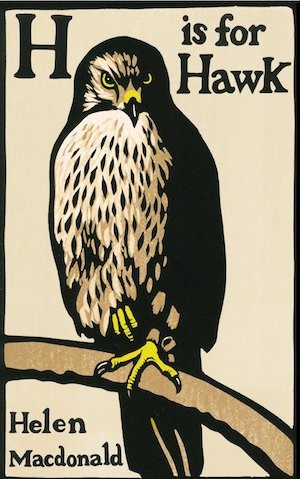H is for Hawk and H is for Helen MacDonald. An in-depth account of the author’s experience training a goshawk after the loss of a dear parent, it would indeed be correct, and natural, to categorise this book as “Nature” and “Memoir”. In the past, though, those categories have left me a little cool – (with exceptions of course) the former often too pedantic, and the latter a little too self-absorbed to regularly engender great writing. This is not the case with H is for Hawk which showcases some exceptionally sublime writing.
Deftly structured and beautifully written, MacDonald could write about a plastic bag and make it alluring, crushing, exhilarating. Her subject, though, is rather worthier. After the loss of her inspirational photographer father, the author begins with the grief of that loss and her withdrawal from society. Both as a healing process and as a protection against facing the world again, she makes a decision – culminating a life-long fascination with falconry – to train a goshawk, long considered the most temperamental and difficult of birds. It’s a fascinating process but it is really her exploration of loss and obsession, historical attitudes and interpretations within falconry, and social expectations of normality that gives the book its thrust.
Using T.H.White’s book about his failed attempt at training a goshawk (The Goshawk), his troubled personal life and other writings, MacDonald counter balances her story and her training of Mabel. Although their experiences – both in life and hawk-training – are vastly different, both books represent a tortured and complex journey. Of The Goshawk, MacDonald writes:
Underneath it all is history and sexuality, and childhood, and landscape, and mastery and medievalism, and war, and teaching and learning and love. All those thing were going to be in the book he was writing about the hawk.
The same could be said of H is for Hawk. It is a narrative that marries her personal struggle with the falconry project at hand while also questioning some similar topics of history, myths, genders, of love and much more. From dusting off books by stuffy misogynists and one-sided perspectives, to mentions of hawkish legends and the history and culture of falconry; she recounts the themes of Merlyn/Arthur, of ancient kings in poetry, and of obsession, desperation and madness.
Her interpretive voice interweaves all the threads seamlessly and ideas insinuate themselves, drawing you in. By the time you think that there can be no better achievement in the world than training this magnificent creature, you realise too that the author is perhaps a little too empathetic with the wild and a little too anti-social to be healthy.
MacDonald writes with fluid and striking brushes: simultaneously urgent and yet wielded with infinite tenderness. When she writes about Mabel it’s all tension and thrill and fixation.
…there’s a clatter of wings. We both look up. There’s a pigeon, a woodpigeon, sailing down to roost in a lime tree above us. Time slows. The air thickens and the hawk is transformed. It’s as if all her weapons systems were suddenly engaged. Red cross-hairs. She stands on her toes and cranes her neck. This. This flightpath. This thing, she thinks. This is fascinating. Some part of the hawk’s young brain has just worked something out, and it has everything to do with death.
At other times her observations, full of rhythm and poetry, spotlight the English landscape, celebrating it even when it is not at its most alluring:
It’s turned cold: cold so that saucers of ice lie in the mud, blank and crazed as antique porcelain. Cold so the hedges are alive with Baltic blackbirds; so cold that each breath hangs like parcelled seafog in the air. The blue sky rings with it, and the bell on Mabel’s tail is dimmed with condensation. Cold, cold, cold.
A magical and moving story of loss, love, obsession, depression and redemption disguised as “merely” a nature/memoir book.
H is for Hawk has been awarded the Samuel Johnson Prize for Non-Fiction 2014, the Costa Book of the Year Award 2014 and was named book of the year by The Economist and The Guardian.
H is for Hawk is published by Vintage Books, 320 pages.





